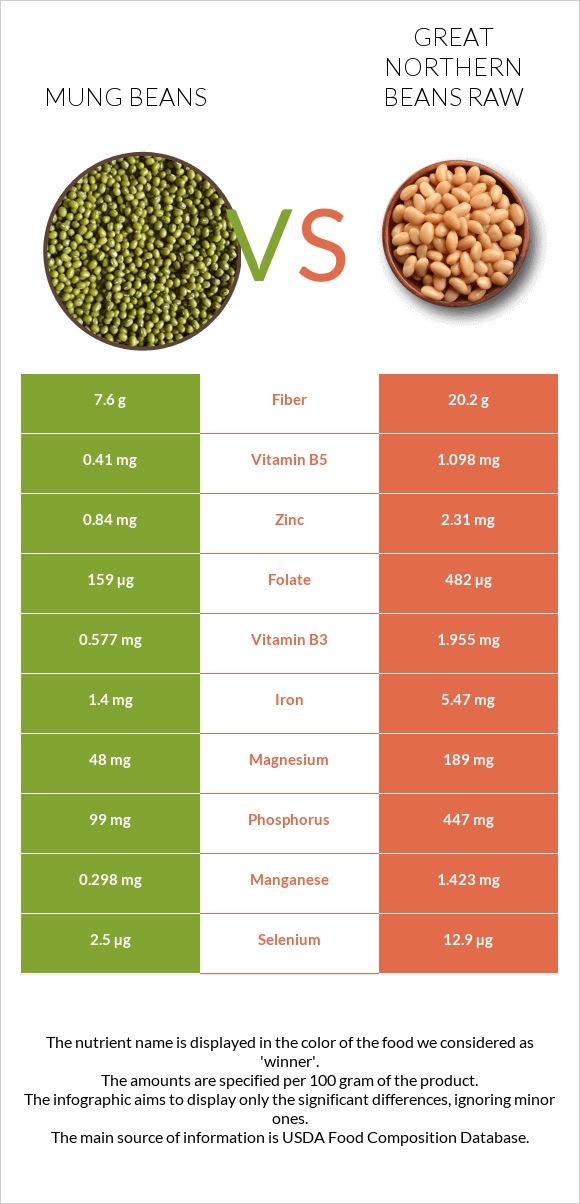Mung beans vs. Great northern beans raw — In-Depth Nutrition Comparison
Compare
A recap on the differences between mung beans and great northern beans raw
- Mung beans have less folate, copper, iron, fiber, phosphorus, manganese, vitamin B1, magnesium, potassium, and vitamin B6.
- Great northern beans raw cover your daily folate needs 81% more than mung beans.
Food varieties used in this article are Mung beans, mature seeds, cooked, boiled, without salt and Beans, great northern, mature seeds, raw.
Infographic

Infographic link
Mineral Comparison
Mineral comparison score is based on the number of minerals by which one or the other food is richer. The "coverage" charts below show how much of the daily needs can be covered by 300 grams of the food.
| Contains less SodiumSodium | -85.7% |
| Contains more MagnesiumMagnesium | +293.8% |
| Contains more CalciumCalcium | +548.1% |
| Contains more PotassiumPotassium | +421.4% |
| Contains more IronIron | +290.7% |
| Contains more CopperCopper | +436.5% |
| Contains more ZincZinc | +175% |
| Contains more PhosphorusPhosphorus | +351.5% |
| Contains more ManganeseManganese | +377.5% |
| Contains more SeleniumSelenium | +416% |
Vitamin Comparison
Vitamin comparison score is based on the number of vitamins by which one or the other food is richer. The "coverage" charts below show how much of the daily needs can be covered by 300 grams of the food.
| Contains more Vitamin AVitamin A | +∞% |
| Contains more Vitamin CVitamin C | +430% |
| Contains more Vitamin EVitamin E | +46.7% |
| Contains more Vitamin B1Vitamin B1 | +298.2% |
| Contains more Vitamin B2Vitamin B2 | +288.5% |
| Contains more Vitamin B3Vitamin B3 | +238.8% |
| Contains more Vitamin B5Vitamin B5 | +167.8% |
| Contains more Vitamin B6Vitamin B6 | +567.2% |
| Contains more Vitamin KVitamin K | +122.2% |
| Contains more FolateFolate | +203.1% |
All nutrients comparison - raw data values
| Nutrient |  |
 |
DV% diff. |
| Folate | 159µg | 482µg | 81% |
| Copper | 0.156mg | 0.837mg | 76% |
| Iron | 1.4mg | 5.47mg | 51% |
| Fiber | 7.6g | 20.2g | 50% |
| Phosphorus | 99mg | 447mg | 50% |
| Manganese | 0.298mg | 1.423mg | 49% |
| Vitamin B1 | 0.164mg | 0.653mg | 41% |
| Magnesium | 48mg | 189mg | 34% |
| Potassium | 266mg | 1387mg | 33% |
| Protein | 7.02g | 21.86g | 30% |
| Vitamin B6 | 0.067mg | 0.447mg | 29% |
| Selenium | 2.5µg | 12.9µg | 19% |
| Calcium | 27mg | 175mg | 15% |
| Carbs | 19.15g | 62.37g | 14% |
| Vitamin B2 | 0.061mg | 0.237mg | 14% |
| Vitamin B5 | 0.41mg | 1.098mg | 14% |
| Zinc | 0.84mg | 2.31mg | 13% |
| Calories | 105kcal | 339kcal | 12% |
| Vitamin B3 | 0.577mg | 1.955mg | 9% |
| Vitamin C | 1mg | 5.3mg | 5% |
| Choline | 29.4mg | 5% | |
| Vitamin K | 2.7µg | 6µg | 3% |
| Polyunsaturated fat | 0.128g | 0.477g | 2% |
| Fats | 0.38g | 1.14g | 1% |
| Sodium | 2mg | 14mg | 1% |
| Saturated fat | 0.116g | 0.356g | 1% |
| Net carbs | 11.55g | 42.17g | N/A |
| Sugar | 2g | 2.26g | N/A |
| Vitamin A | 1µg | 0µg | 0% |
| Vitamin E | 0.15mg | 0.22mg | 0% |
| Monounsaturated fat | 0.054g | 0.053g | 0% |
| Tryptophan | 0.076mg | 0.259mg | 0% |
| Threonine | 0.23mg | 0.92mg | 0% |
| Isoleucine | 0.297mg | 0.965mg | 0% |
| Leucine | 0.544mg | 1.745mg | 0% |
| Lysine | 0.49mg | 1.5mg | 0% |
| Methionine | 0.084mg | 0.329mg | 0% |
| Phenylalanine | 0.425mg | 1.182mg | 0% |
| Valine | 0.364mg | 1.144mg | 0% |
| Histidine | 0.205mg | 0.608mg | 0% |
Macronutrient Comparison
Macronutrient breakdown side-by-side comparison
Protein:
7.02 g
Fats:
0.38 g
Carbs:
19.15 g
Water:
72.66 g
Other:
0.79 g
Protein:
21.86 g
Fats:
1.14 g
Carbs:
62.37 g
Water:
10.7 g
Other:
3.93 g
| Contains more WaterWater | +579.1% |
| Contains more ProteinProtein | +211.4% |
| Contains more FatsFats | +200% |
| Contains more CarbsCarbs | +225.7% |
| Contains more OtherOther | +397.5% |
Fat Type Comparison
Fat type breakdown side-by-side comparison
Saturated fat:
Sat. Fat
0.116 g
Monounsaturated fat:
Mono. Fat
0.054 g
Polyunsaturated fat:
Poly. Fat
0.128 g
Saturated fat:
Sat. Fat
0.356 g
Monounsaturated fat:
Mono. Fat
0.053 g
Polyunsaturated fat:
Poly. Fat
0.477 g
| Contains less Sat. FatSaturated fat | -67.4% |
| Contains more Poly. FatPolyunsaturated fat | +272.7% |
~equal in
Monounsaturated fat
~0.053g